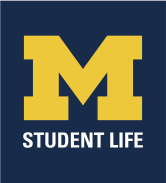During this unusual academic year, U-M continues to provide comprehensive wellness, support, and DEI programs by adding virtual offerings. Many Student Life services and programs to help your student have a positive experience and work through challenges and concerns have gone virtual.
Here’s a look at what’s available for your student:
Counseling and Psychological Services (CAPS), provides services that strengthen your student’s mental health, especially during a most challenging Fall semester. Confidential tele-counseling, crisis support, and virtual outreach are available. Committed to creating an environment based on multicultural, multi-disciplinary and multi-theoretical practices, CAPS is open to assist with your students’ needs Monday-Friday, 9am-5pm and can be reached by phone (734 764 8312) or by coming in to our central office (Michigan Union 4th Floor). CAPS After Hours Urgent Support remains an option for urgent support when CAPS is not open. All Pandemic updates will be maintained via our Pandemic FAQ page.
SilverCloud -- CAPS recently launched a new tool, SilverCloud, that is accessible via the CAPS website.
SilverCloud is an online platform that offers self-guided programs for anxiety, depression, stress, resilience, or insomnia. Based on cognitive behavioral therapy principles, the self-guided program is available anytime, on any device. This adds to the many existing supports in CAPS, UHS, SAPAC, and SSD. SilverCloud can be accessed 24/7 and can be used whenever students want, at their own pace.
SilverCloud is not meant to replace existing services in any way, but rather to serve as an additional, time-flexible option for those who wish to manage day-to-day stressors personally and anonymously.
The website provides an overview of options and a brief quiz to help your students find the right program to get started. Once they have selected a program, they can explore more topics on the signup page. Using the resource, your students can help manage day-to-day stresses and anxiety, improve resilience, learn skills to understand thoughts, feelings, and behaviors, and reduce symptoms of depression and anxiety.
The Spectrum Center, which works to enrich the campus experience and help students of all sexual orientations, gender identities and gender expressions to develop individually, offers a number of services and events to create an inclusive campus community free of discrimination. At the onset of COVID-19, Spectrum implemented Virtual Drop-In Hours.
The Sexual Assault Prevention and Awareness Center (SAPAC) provides a wide array of supportive services for survivors of sexual assault, intimate partner violence, stalking, sexual harassment, and gender-based harassment to help them grow, heal, and share their stories. Through individual support and advocacy, peer led support groups, and community education and training. SAPAC staff are still working and meeting with students and others by phone and through video conferencing. SAPAC can be reached by email at [email protected] or call 734-764-7771. If your student needs to talk with someone after hours, they can call the 24/7 Crisis Line at 734-936-3333.
Multi-Ethnic Student Affairs (MESA) also offers virtual appointments. From events to promote social listening and new ways to bring students into the community to cultural and educational programming that fosters diversity and inclusion, MESA continues to encourage students through the lens of race and ethnicity. Email MESA at [email protected]
The Dean of Students Office is available to students, parents/families, and faculty/staff who have questions about student support and assistance (in general and particularly related to COVID-19) and/or who are concerned about a student’s well-being. Staff members can talk with parents/families and your student about resources and support available including: quarantine and isolation needs; academic support; financial concerns, including emergency funding; campus climate concerns; off-campus roommate concerns or questions; and direct referrals to health and wellbeing resources. Your student can reach out to the Dean of Students by telephone, email, and online.

